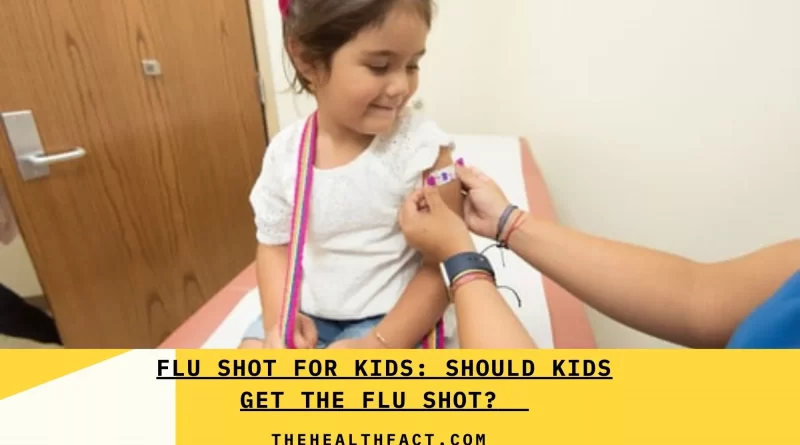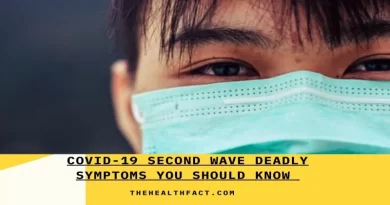Flu Shot for Kids: Should Kids Get the Flu Shot
Table of Contents
Should Kids Get The Flu Shot?
Flu among children can be widely seen, and for that reason, kids need to get the flu shot. As there are many vaccinations available for kids such as influenza. It’s not always possible to recognize the flu though it can spread too fast. Flu is a communicable infection and one can acquire it through the contact of some other infected person.
However, the common symptoms of flu are cold and cough which stays for 2-3 days. But, to understand it more we will discuss each portion about kids’ flu shots.
What Is Flu?
The flu is a common viral infection, which infects the lungs, nose, and throat. The immunity works here. People with weak immunity may encounter severe respiratory infections. It is a communicable virus. A recent example of a viral infection in front of us is a coronavirus. It affects the respiratory system.
What Are The Symptoms Of Flu?
- Sudden high fever up to 104 degrees F
- Chills and shaking
- Body aches
- Headache
- Sore throat
- Nausea and vomiting
- Abdomen pain
What Causes The Flu?
There are some viruses that cause the flu such as the influenza virus. The various types of other viruses spread the infection. The influenza virus is categorized into types A, B, C, D.
Should I Get My Child The Flu Shot This Year?
Well, in maximum cases the Centers for Disease and Prevention( CDC) recommends an annual flu vaccine for all children of 6 months or older. This year the CDC recommended the flu shot for kids or the nasal spray flu vaccine.
Flu shots for kids are the best way to prevent them from possible harmful outcomes. Though, flu vaccines don’t completely turn down the infection. But it can help in activating the immune system to fight against any viral infection. The chances of risk minimize and hospitalization with the help of these flu shots for kids.
Every kid needs immunization. The continuous spread of covid-19 infection makes it necessary to get the kids the flu shot. As the symptoms for both infections are quite similar.
What Flu Vaccines Do?
Flu vaccines could reduce the symptoms that might be caused due to Covid-19. Thus, in the season of the pandemic, do not take risks to your kid’s health. You may have heard about antibodies this year a lot. Because the main work of these vaccines is forming antibodies by fighting with the pathogens.
The reduction in the symptoms is the result of the antigen-antibody response. Flu shots for kids not only prevent them from the illness but also lessens the stress on the health care system. كيف تربح المال من النت
The flu vaccine can’t give your child the flu. The vaccine also doesn’t protect your child from COVID-19 or increase your child’s risk of COVID-19.
You might be able to choose the flu shot and nasal spray flu vaccines depending on the child’s age and health.
Types Of The Flu Shot
Flu shot:- flu shots can be given to a child of 6 months or older. Some mild side effects include redness, soreness, and swelling at the place of the vaccine shot. Mild fever and body aches can also occur.
Nasal spray:– the nasal spray flu shot can be given to children of 2 years and older. Side effects of the nasal spray in children include headache, runny nose, wheezing, vomiting, muscle aches, and mild fever.
The flu vaccine contains partially killed pathogens. Hence, the flu shot doesn’t cause your children the flu.
The number of doses of flu vaccine depends on certain factors:
2 doses:- if the child is younger than 9 years and is getting the first flu vaccine or has had one dose of vaccine overall prior to July 1, 2020, the doses will be given in the gap of at least four weeks.
1 dose:- if the child has had two or more flu vaccines in four weeks apart from the first dose any time prior to July 1, 2020, one dose is sufficient for the year. And in case if your child gets the flu vaccine for the first time, one dose is enough.
After vaccination, it takes two weeks to be protected from the flu.
Consult a doctor if your child has the following problem:-
If your child is not feeling well:- if your child has any mild illness, delay the flu vaccination until he or she recovers. Nasal congestion may interfere with the delivery of nasal spray.
If your child has any pre-medical condition:- the nasal spray vaccine is not suitable for children between 2 and 17, and who are taking aspirin and salicylate-containing medicine. It is also not recommended for children ages 2 and who have had been diagnosed with asthma or have had wheezing in the past year. The nasal spray flu vaccine shot for kids is not appropriate for children with weakened immune systems or having contact with other children of weak immunity.
If your child had a severe side effect from a previous flu vaccine:- the flu shot vaccine is not recommended for those who have had some noticeable severe side effects from the previous flu shot. Though, some reactions might not link to the vaccine. Consult your pediatrician for such cases.
Conclusion
Flu shots for kids are necessary to prevent them from the harmful effects of the viruses. There are enough viral infections to damage the child’s health system such as influenza, whose symptoms resemble the coronavirus infection. Kids need to get the flu shot for the enhancement of the immune system as well as the low burden on the health care system. Should I get my child the flu shot? Well, for such a question you need to check if your children are not feeling well or have asthma and some other pre-medical condition. If this so, then you need to delay the vaccination and should consult your pediatrician for so.
Frequently Asked Questions
Should I vaccinate my child for Covid?
Many experts say it will be crucial to vaccinate your kids in order to reduce the spread of the virus in the community. However, many parents are unsure about vaccinating their children for different reasons. One of the common reasons is that the vaccine is new and not enough data is there to show its efficacy over kids. While some parents are ready to vaccinate their kids for better results. The conclusion is as soon as the vaccine is available for the children group, get your child vaccinated.
Who shouldn’t get the Covid vaccine?
When the vaccine is a life savior for all of us, some groups of people are still not eligible for its advantage. It includes the people who have severe allergies from vaccine components like allergy from injectable medicines or anaphylaxis should not take the covid vaccine. Nonetheless, Indian health authorities do not allow vaccination of children below 18 years, though they are also at risk of getting an infection. Moreover, people with thrombocytopenia or with low platelet count should be cautious while taking the vaccination.
What are the side effects of Covid-19 vaccine?
Almost every person felt a few side effects after receiving the covid-19 vaccine. The most common side effects are fatigue, fever, chills, body pain, headaches,diarrhoea, nausea, and pain at the site of injection as per the world health organization. However, one of the least common side effects is a covid rash which occurs rarely to the patients.
How COVID-19 compares to influenza?
Covid-19 is more severe than influenza. We have proper vaccines and medications for influenza and people are immunized by influenza. While covid-19 is still a high-risk factor for people. Covid-19 is highly communicable and can infect people in clusters. The events are the super-spreaders of the infection. However, the big difference is that both infections are different, covid-19 is spread by coronavirus while influenza is caused by a variety of influenza viruses. Although, the symptoms are quite similar for the two.
Are there face masks that should not be worn during the COVID-19 pandemic?
A face mask limits the amount and travel distance of expiring droplets spread while talking, breathing, or coughing. A face mask with no holes and vents will also filter out the virus particles from inhaled or exhaled air. Thus, wearing a face mask will prevent you from getting the infection.
But yes, face masks include an exhalation valve, then the wearer who is infected would probably transmit the infection outwards through it. Hence, the mask with exhalation valve would not be good for infected wearers and are not in stopping the pandemic. That’s why many countries and jurisdictions encourage and mandate the use of face masks or cloth face covers by the public to minimize the spread of infection.
Can air conditioners (AC) be used during the COVID-19 pandemic?
Well, air conditioners are unavoidable in hot and humid conditions. The air conditioners we use at home are quite safe. However, a slightly open window is recommended for allowing fresh air circulation. Windows can be kept slightly open with a running AC. As yet there is no evidence of the spread of covid-19 from the air coming out of air conditioners. As per the guidelines of standard advisory, the temperature of AC should be between 24-30 degrees Celsius with a humidity rate between 40-70%.
What can I do to ease my fear during the coronavirus pandemic?
Well, there are plenty of things you can do during the pandemic. It’s common to feel fear and anxiety during these hard times but you have to be patient and calm to maintain your physical and mental health. The first thing you can do is to avoid the news updates on covid-19 as much as possible. The second thing is to focus on your daily routine like exercise well, eat well and do different things you love in order to distract yourself from the outburst of this heavy pandemic.
And the most important thing is to follow all the necessary precautions that have to be taken and advised by the concerned authorities. The fear will only make you mentally weak and unhappy which is not good and needs to be overcome ASAP.
Will climate change make the COVID-19 pandemic worse?
As you know that covid-19 is a highly communicable disease that is spread while talking, breathing, coughing, and sneezing. Hence, it becomes our responsibility not to take chances and not to put someone else at risk of getting an infection. It’s better to meet people virtually through video conferences. Otherwise if it’s compulsory to meet people be cautious and take all the precautions that time. Like wearing masks, social distancing and repeated hand sanitization should be done properly.
Can COVID-19 be transmitted through water?
No covid-19 does not spread through water. The spread of covid-19 will only happen when two people are in close contact or inhaled in the air which is infected by someone’s sneezing or coughing. So, if you are worried about getting covid while swimming, don’t worry it won’t infect you. Take care that the water of the pool should be clean and well maintained and avoid contact with other swimmers.
Are the elderly more vulnerable to the coronavirus disease?
The covid-19 pandemic is affecting a large population worldwide. Almost every country has reported some cases of covid and also some most severe cases. Although every age group is susceptible to receiving and passing on the infection, the elderly group is more vulnerable due to physiological changes that often come with aging and with chances of an underlying medical condition.




Pingback: Flu V/S Covid -19: How is Flu Different From Covid-19 - The Health Fact